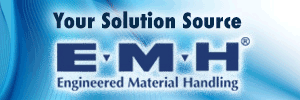Wiper Rule Endorses Reusable Textile Services Operations
The final rule modifies the definition of solid waste in the RCRA to conditionally exclude solvent-contaminated wipes that are cleaned and reused.
Posted: September 10, 2013
TRSA is pleased with the enactment of the final rule published recently in the Federal Register modifying EPA hazardous-waste management regulations for solvent-contaminated wipes, a measure TRSA has consistently advocated since it was first proposed in 2003.
The rule codifies TRSA’s (Alexandria, VA) best practices for soiled reusable textile handling, published 20 years ago, which eliminate free liquid from being transported with shop towels and other laundered products sent to textile services facilities for washing and reuse.
The association views the measure’s implementation aligning with other EPA activities in recent years that recognize the members’ commitment to environmental stewardship.
The final rule modifies the definition of solid waste in the Resource Conservation and Recovery Act (RCRA) to conditionally exclude solvent-contaminated wipes that are cleaned and reused. It also revises the definition of hazardous waste to exclude shop towels contaminated with solvents listed as hazardous wastes under RCRA, provided that the solvents are cleaned and disposed of properly.
Wipes are used with solvents for cleaning and other purposes by tens of thousands of facilities in numerous industrial sectors, such as printers, automobile repair shops and manufacturers of automobiles, electronics, furniture and chemicals. Commercial laundries handle, wash and return clean wipes to their customers as part of the industrial laundry business.
“Reusable textile products reduce waste and protect workers. Implementing this rule acknowledges these contributions and that these items play an important role in waste minimization in a variety of industries across the economy,” observed Kevin Schwalb, TRSA’s vice president of government relations. “Reusables’ utility and price continue to make them the product of first choice when compared with disposable products.”
The firm is working with EPA on another effort—involving nonylphenol ethoxylates (NPEs), a detergent ingredient. Cooperation began in 2010 when TRSA told EPA in a letter that the association would support eliminating NPEs from all liquid detergent formulations.
The agency responded with a phase-out schedule for textile services operators. Last year, in an analysis of NPE alternatives, EPA cited TRSA’s constituency for progress toward NPE elimination and credited such laundries as the only industry, among several targeted for such substitution, moving ahead with deploying these alternatives.
In 2008, the company received Champion status in the Safer Detergents Stewardship Initiative (SDSI), part of EPA’s Design for the Environment (DfE) program. SDSI recognizes environmental leaders who voluntarily commit to the use of safer surfactants, which break down quickly to non-polluting compounds and help protect aquatic life in both fresh and salt water.
The two partnered to develop the Laundry Environmental Stewardship Initiative (LaundryESP®), begun in 2000. This voluntary pollution prevention and resource conservation program enables TRSA to facilitate the industry’s continued commitment to increasingly efficient use of natural resources. It is a cost-effective and flexible methodology for tracking improvement and creating more sustainable business practices.
Results compiled on laundry operations since the program’s inception demonstrate to the industry’s customers and regulators and environmental groups that textile service operations have made great strides in instituting company-specific initiatives that advance LaundryESP®’s mission.










